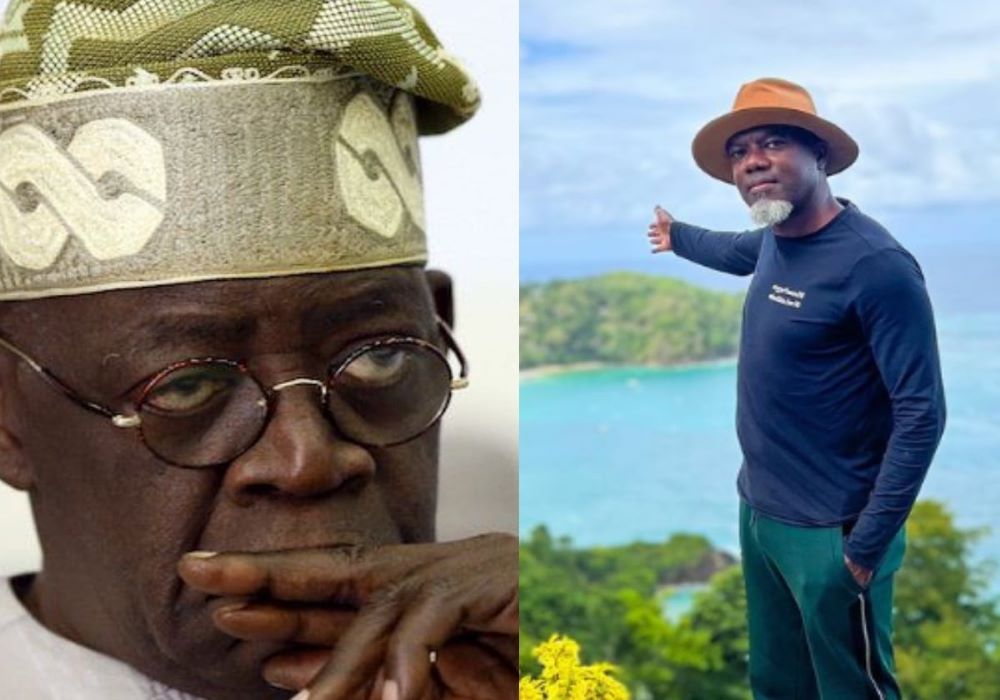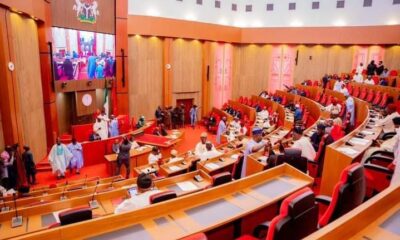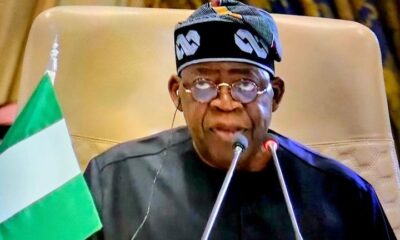Opinion/Feature
If I were Tinubu 3: Setting a Tinubunomic agenda – Part 1
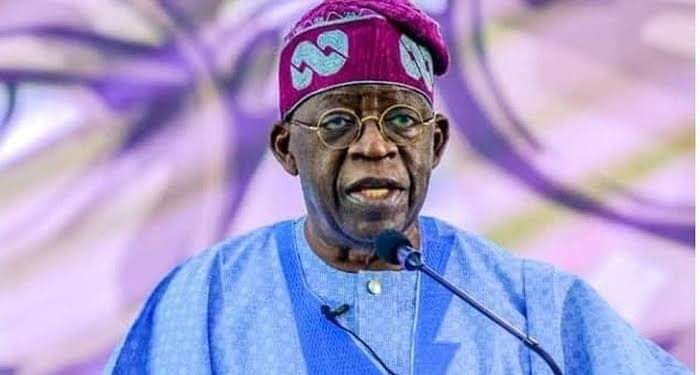
By Segun Adeleye
‘When the righteous are in authority, the people rejoice: but when the wicked beareth rule, the people mourn.’
To say things are tough in Nigeria will be an understatement, with fuel scarcity, naira redesign crisis, bad roads, poor power supply, joblessness among others things that make life miserable for citizens.
When COVID-19 hit the world in 2019, there was nothing like it in recent history as people were locked in their homes with little or no food, while government palliative measures in Nigeria to send food to homes failed. It was later discovered that some people hoarded food, waiting for the right time to sell and profit from the mysteries of fellow citizens.
Now fast forward to 2023. It was a bigger crisis created by the central bank in an attempt to redesign currencies and withdraw the old ones just few weeks to a national election that will produce new set of leaders that will serve for another four years.
As if the central bank got its research wrong that the volume of new currencies to replace the old ones being recalled would not adequately go round, the cash shortage crisis that resulted brought the entire economy to its knees, with small businesses closing down, hunger hitting homes while protests erupted across the country as banks closed down with no cash to disburse and the fear of being attacked.
Not a few people believe that the naira redesign crisis is worse than COVID-19 with the perennial fuel scarcity and power outages no longer seen as major contenders for the afflictions of the African most populous country.
From the International Monetary Fund’s World Economic Outlook for October 2022, Nigeria economy didn’t grow and perform as expected due to structural economic shocks and challenges brought about by the global fall in oil prices, which was a fall-out of the Russia-Ukraine war.
Nigeria’s economic potential is said to be constrained by many structural issues, including inadequate infrastructure, tariff and non-tariff barriers to trade, obstacles to investment, lack of confidence in currency valuation, and limited foreign exchange capacity.
Other similar reports had traced Nigeria’s biggest economic problems to corruption, poor human development, over-dependence on crude oil, crime and terrorism, low export earnings, high rate of unemployment, lack of infrastructure among others.
With high inflation which hit 21.91% in February 2023, taking a toll on household’s welfare and high prices said to have pushed an additional 8 million Nigerians into poverty, the country is ranked 103 out of 121 countries in the 2022 Global Hunger Index (GHI), a position that signifies a level of hunger that is serious.
World Bank in its 2022 Poverty and Prosperity Report said Nigeria contributed three million people to global extreme poverty, while the country is “home to a large share of the global extreme poor.”
This is the economy that the President-elect, Asiwaju Bola Tinubu is going to inherit with unemployment rate of 32.1%, public debt at 36.6% of GDP together with a population of over 200 million, majority of who will try everything possible to escape to other countries where they believe that things can never be this bad.
PRODUCTIVITY
Nigeria’s national productivity growth rate has been low due to what observers linked to infrastructure deficit, unemployment and youth challenges, constant strike actions, brain drain, corruption, insecurity, poor workers’ attitude to work. Up to 80 percent of workers are said to be employed in sectors with low levels of productivity—agriculture and non-tradable services, which means that the kind of jobs needed to generate income growth and lift many Nigerians out of poverty are not available in large numbers.
A major problem facing the economy is the neglect of the manufacturing sector, with the country not producing enough, for both local consumption and export, with statistic showing that non-oil exports as a share of non-oil GDP averaged 1.3 percent while manufactured goods as a share of total exports remained low at 5.2 percent in 2021.
The Tinubu administration will be expected to develop an economic agenda with a practical strategy on how to structurally transform the economy, moving labor and economic resources from low productivity sectors to high productivity sectors.
To implement policies that will deliver an inclusive and competitive economy, first, it may have to rattle feathers in getting professionals to head all the strategic government agencies which are currently headed by mediocrities. It will definitely create bad blood among those that have seen such jobs as their birthrights, but the assurance of a greater opportunity in an expanded economy that will profit all should assuage any aggrieved interest with entitlement mindset. If the economy is productive and people are earning healthy wages in the private sector, the rush for government jobs and appointments will definitely drop. But under no disguise must any of the strategic government agencies be manned by unqualified persons again.
STARTUPS AND JOBS
Data from the National Bureau of Statistics indicated that unemployment and underemployment rates increased to an all-time high of 56.1 percent in 2020, pushing 133 million Nigerians into multidimensional poverty with economic growth not inclusive as it faced key challenges of lower productivity, weak expansion of sectors with high employment elasticity.
Getting the youths to work must be an immediate task for the new government and will be driven by fixing productivity through combinations of policies that cut across some strategic sectors of the economy. With a population of over 200 million, it’s obvious that a weak manufacturing base can only yield foreign exchange shortages, limited number of jobs created to accommodate workforce entrants, and an import bill that can hardly be met by export earnings.
Starting with national registrations of all unemployed youths across the country through dedicated local government centers, the policies that will get them engaged should explore opportunities in strategic sectors such as blue economy, energy , digital economy, mining, sport, agriculture and tourism, and get them to seamlessly access the Nigeria Youth Investment Fund approved by the outgoing government to support entrepreneurship for the over 68 million Nigerian youths between ages 18 and 35. This will instantly have impact on getting the youth to start doing business. The new entrepreneurs will need trainings, mentorship to grow and this can be provided by the well established ones including the multinationals which must be mandated to deliberately accommodate them for an agreed period, even if it will be at the expense of subsidy and tax incentives from government.
Many startups that need to be encouraged by the coming government are currently springing up in Nigeria, developing technology to fix identified problems in payment systems, insurance, agribusiness, e-commerce among others. The beauty of their emergence is that their concepts are globally acceptable, making them eligible to expand to other countries while attracting foreign exchange and creating new jobs.
Very laudable is the latest $600 million Investment in Digital and Creative Enterprises (i-DICE) Programme with funding from the African Development Bank (AfDB), the Islamic Development Bank (IsDB), the Agence Française de Développement and FG through the Bank of Industry to support young Nigerians ranging from ages 15-35 who are entrepreneurs at the early stages in creative, innovative and technology-enabled ventures.
I attended a forum sometime when an expert said that if the government can provide a grant of just $100,000 each for 100 youths, they will be capable of solving the nation’s economic problems in the medium and long term.
The incoming government should explore similar initiatives to raise funds to encourage more startups that will be building solutions to solve identified problems that are still numerous in Nigeria because it’s still an underdeveloped economy.
OIL AND GAS
Even though oil and gas is going out of fashion globally with migration to clean energy, Nigeria will still need all it can get in the short and medium term from oil to industrialise its economy.
The President-elect will need the right professionals to run the oil industry. Specifically, there will be a need for a total overhaul of the system. The new NNPC Limited should be made to advertise the positions of its CEO and other top directors to attract the right professionals from all over the world. If a small Nigerian independent energy firm, Seplat Energy Plc with assets which cannot be up to 1% of NNPC can be so profitable to the extent of declaring $951.8 million revenues for 2022, there is no reason why the national oil company which has always been declaring losses should not be making over $100 billion in a year.
It is also very important that the government must do everything possible to provide incentives and attract investors for the realization of the Trans Atlantic gas project that will take Nigerian gas through North Africa to market in Europe.
There will also be a need to remove fuel subsidy at the early stage of the administration as the commodity is no more available at the subsidized price, couple with the associated scarcity, but government must deliberately develop a scheme to subsidise transportation cost for the indigent people that will be mostly hit by economic hardship. A specialized e-card can be issued for them to access subsidized transportation services for a period of time.
While ensuring effective management of the oil and gas assets for the nation to receive commensurate returns, the oil industry must be made to adopt the right energy transition strategy so that the nation will not miss the opportunity to be a leader in clean energy without becoming the dumping ground for foreign technologies in the long term.
In extension, the mining sector must receive the necessary attention for it to live up to its potential. Law must be reviewed to end illegal mining which has been the bane of the sector.
AGRICULTURE
It was not until the recent invasion of Ukraine by Russia that it dawned on many that the country of only 43.79 million is the leading food basket of the world. It accounts for 10% of the world wheat market, 15% of the corn market, and 13% of the barley market. With more than 50% of world trade, it is also the main player on the sunflower oil market.
Nigeria with a total of 79 million hectares of agricultural land and only 44% being cultivated should naturally be the food basket of Africa. But not only that it’s failing to fulfill this purpose, it’s contending with an annual food import of $20 billion.
There are some exportable agricultural products that keep on having growing global demands which Nigeria has the right climate to produce to quickly bridge its foreign exchange gap in few years.
A list of items with high global demand that Nigeria can exponentially raise its cultivation and export includes; ginger, cocoa butter, rubber, palm kernel oil, textiles and garments, gallstone, sesame seed, garlic, yam tubers, charcoal, cotton, cassava floor, cashew nuts, honey among other.
With over $40 billion earnings from crude oil but mere $10 billion from non-crude in 2021, it’s interesting to note that Nigeria can be positioned to capture a major slice the global sesame oil market which is anticipated to expand to $ 10.7 billion over the 2021-2031 period; cassava starch is projected to reach $66.84 billion by 2026; cashew is estimated to reach $10.5 billion by 2031; ginger is projected to reach $7.53 billion by 2028.
The Tinubu government can return to agriculture and make it the number one foreign exchange earner for the country by attracting investments and partnering the state governments based on the agricultural products they are the best at. The farm settlements that the government will promote should be mechanized, modernized with all amenities in the cities such as sporting and recreation centers with cable TV among others to attract youths and help solve unemployment problem.
*Segun Adeleye is the President/CEO, World Stage Limited; Creator, OELA Music; Author of ‘So Long Too Long Nigeria’ and Founder/Chairman, Segun Adeleye Foundation for Good Leadership in Africa (SAFFGLIA).
Opinion/Feature
Securing Edo State: Gov Okpebholo’s Unwavering Fight Against Crime

By Fred Itua
Crime is a fundamental threat to societal stability, and in Edo State, it has manifested in various troubling forms — ranging from kidnapping and cult-related violence to armed robbery and illegal land grabbing.
For years, criminal elements have terrorized communities, disrupted businesses, and put lives at risk. The inefficiency of past administrations allowed insecurity to fester, exemplified by incidents such as the kidnapping of Anthony Aziegbemi, chairman of the opposition Peoples Democratic Party (PDP), while the PDP was in power. This highlighted the failure of past security measures and underscored that insecurity did not start today.
ALSO READ: Atiku Decries Declaration Of State Of Emergency In Rivers State
Since assuming office, Governor Monday Okpebholo has demonstrated an unwavering commitment to tackling crime head-on. Through a well-coordinated security strategy, his administration has empowered law enforcement agencies, revitalized community-based security networks, and upgraded infrastructure to enhance public safety. His approach is strategic, pragmatic, and people-focused, combining intelligence-driven policing, community engagement, and infrastructural investment to make Edo safer for residents, investors, and visitors alike.
One of the key pillars of Governor Okpebholo’s security strategy is strengthening Edo State’s security architecture. His administration has prioritized equipping law enforcement agencies with the necessary tools to combat crime effectively. This includes providing operational vehicles, advanced communication gadgets, and logistical support to enhance rapid response capabilities. Additionally, the government has revitalized and funded security task forces, particularly those focused on kidnapping, cultism, and armed robbery.
Under his leadership, there has been a sustained crackdown on criminal syndicates operating in the state. Reports indicate that several notorious kidnappers have been arrested, and many victims have been rescued due to swift, coordinated security operations.
The Edo State Security Network (ESSN) has been strengthened, with local vigilante groups complementing the police in intelligence gathering and crime prevention. This multi-layered approach has yielded tangible results, with multiple high-profile arrests recorded in recent months.
Governor Okpebholo’s administration has intensified operations in known crime hotspots. The Special Anti-Kidnapping Task Force has launched aggressive operations along notorious routes such as the Benin-Auchi Road, the Benin-Lagos Expressway, and the Ekpoma-Irrua axis—areas previously plagued by rampant kidnappings. These efforts have dismantled criminal hideouts, leading to the successful rescue of abducted victims and the arrest of key figures behind major kidnapping syndicates.
The Edo State Police Command, in collaboration with the Department of State Services (DSS) and the Nigerian Army, has equally stepped up efforts to neutralize criminal networks. Notable successes include the dismantling of a major kidnapping ring operating in Orhionmwon and Uhunmwonde local government areas, which led to multiple arrests and the recovery of sophisticated weapons.
Similarly, recent raids on cult hideouts in Benin City, Ekpoma, and Auchi resulted in over 50 suspected cultists being apprehended, significantly reducing inter-cult clashes and violent reprisals.
Recognizing the persistent challenge of cult-related violence in Edo State, Governor Okpebholo has implemented a zero-tolerance policy on cultism. In the past, cult clashes led to loss of lives and destruction of property, but security operatives now have clear directives to arrest and prosecute those involved in cult-related violence. Beyond enforcement, the administration has engaged youth organizations, religious leaders, and community elders in peace-building efforts to rehabilitate and reintegrate misguided youths into society.
The government has also taken decisive action against illegal land-grabbing, particularly in Ikpoba-Okha, Oredo, and Egor local government areas. Criminal cartels that previously extorted landowners are being dismantled, restoring confidence in Edo’s property sector and protecting rightful landowners from exploitation.
Governor Okpebholo understands that security cannot be sustained through policing alone. His administration has actively involved traditional rulers, local vigilante groups, and town unions in crime prevention. The Edo State Security Corps has played a crucial role in intelligence gathering and rapid response, particularly in rural areas. Their collaboration with law enforcement agencies has led to increased arrests and a drastic reduction in rural crime rates.
Beyond law enforcement, the government recognizes that economic empowerment is a vital tool in crime prevention. Unemployment remains a major driver of criminal activity, and the administration is addressing this by attracting investments and implementing youth empowerment programs. By focusing on industrialization, agribusiness, and entrepreneurship, the government is reducing the number of idle youths vulnerable to criminal recruitment. Additionally, vocational training and education initiatives are equipping young people with skills that provide them with legitimate sources of income.
While the government has shown commendable leadership in tackling insecurity, lasting success requires collective responsibility. Security is not just the duty of the police or the government — it is a shared commitment that involves every citizen, traditional ruler, religious leader, and community member.
For Edo to achieve sustainable security, community members must actively report suspicious activities and resist shielding criminals under the guise of “protecting our own.”
Traditional rulers and local chiefs must work closely with security agencies to maintain peace within their domains. The judiciary must ensure that criminal cases are handled swiftly and fairly to deter potential offenders. Religious organizations and civil society groups should intensify awareness campaigns promoting non-violence, youth empowerment, and the dangers of criminal activities. The private sector can also support security initiatives by investing in community policing, surveillance systems, and social interventions.
Governor Monday Okpebholo’s determined fight against crime is yielding measurable results. His administration’s strategic initiatives—ranging from strengthening security task forces and cracking down on kidnappers and cultists to investing in job creation and infrastructure—are laying the foundation for a safer and more prosperous Edo State.
However, the fight against crime is not for the government alone. Every Edo resident has a role to play in sustaining the progress made. By working together, Edo State can become a model of security and development—a place where businesses flourish, communities thrive, and families live without fear. The government has set the pace, but it is now up to all stakeholders to consolidate these efforts. The time to act is now.
Itua, the Chief Press Secretary to Edo State Governor, wrote from Benin City.
Opinion/Feature
Why Edo PDP Is On Life Support, Gasping For Relevance
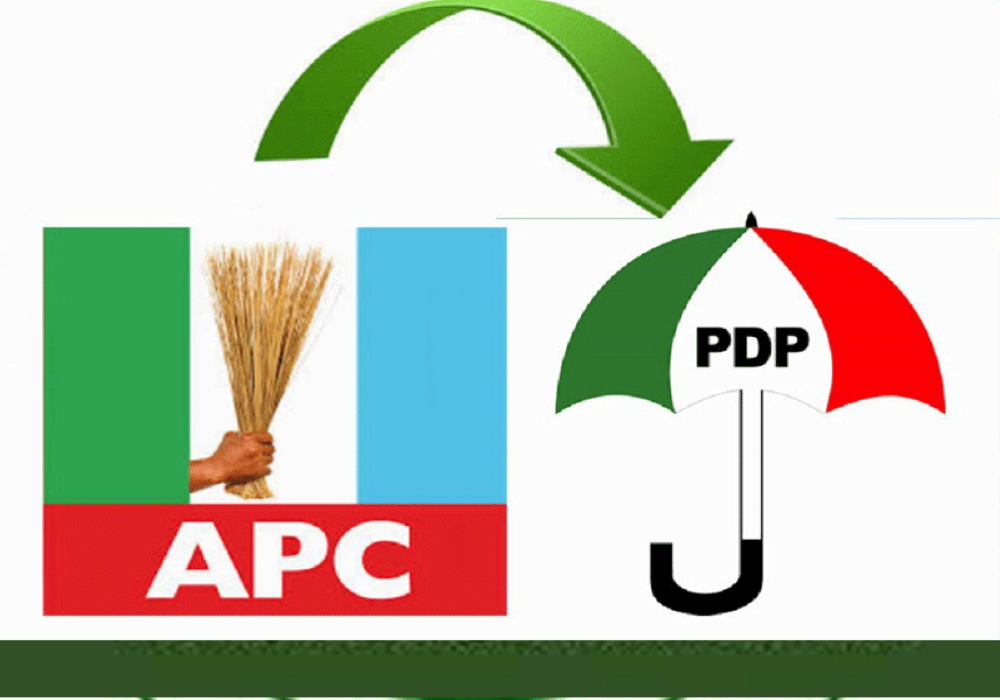
Fred Itua
The Edo State Chapter of the Peoples Democratic Party (PDP) has become the political equivalent of a broken-down car, abandoned by its driver after years of reckless driving. It is a shadow of its former self—a factionalized, internally battered, and directionless entity that, instead of seeking redemption, has resorted to aimless wailing against a government that is steadily gaining the trust of the people.
Much like a drowning man flailing in the waters of irrelevance, the PDP is desperately grasping at anything that gives the illusion of political survival. Their latest antics, rather than winning them public sympathy, only reinforce the obvious: Edo PDP is in the Intensive Care Unit (ICU), gasping for air, and rather than battling for survival, they are wasting their dwindling oxygen on unproductive tantrums.
The PDP is not just a sick party on life support—it is a party suffering from terminal political irrelevance. The faction-ridden, scandal-infested remnants of what was once a ruling party has now been reduced to a collection of desperate voices clinging to lies, propaganda, and outright misinformation in a last-ditch effort to remain in public discourse.
It is ironic that the same party that spent the last eight years squandering the State’s resources and alienating its own members now claims to be the voice of reason. The same party that crushed its foundational members—the Legacy PDP—under the weight of impunity and godfatherism is now pretending to be champions of the people. Their newfound role as self-appointed critics of Governor Monday Okpebholo is not driven by patriotism or concern for Edo’s progress; it is nothing more than the desperate growl of a wounded lion that has lost its territory.
Former Governor Godwin Obaseki and his co-travellers were the architects of PDP’s downfall. They ran the party into the ground with their arrogance, side-lining loyal members, imposing candidates, and rewarding opportunists who saw governance as a personal business empire. Now that they have been rejected at the polls and abandoned by the people, their remaining foot soldiers—men like Ogbeide Faluyi Isibor and Chris Nehikhare—have adopted an attack-dog strategy, barking at every single move of the Okpebholo-led Government.
A glaring example of this political misadventure is Chris Nehikhare, a man whose legacy is tainted with corruption, deceit, and an unquenchable thirst for misleading the public. This is the same man who openly admitted to purchasing a government-owned Prado SUV worth N200 million for a laughable N750,000—daylight robbery that epitomizes the reckless looting culture of the PDP era. And yet, with a straight face, he wants to lecture the good people of Edo on accountability and governance. The irony is staggering.
Take, for example, their fabricated outrage over recent security incidents in Ovia and Okpekpe. While the Okpebholo administration swiftly mobilized security forces and initiated immediate responses to curb the threats, PDP shamelessly tried to spin the situation to cover up their own failures. Under their disastrous leadership, Edo’s security architecture collapsed, leaving citizens at the mercy of criminals. Yet, here they are, pretending to care about security only because it offers them another excuse to criticize.
The difference is clear: PDP ignored insecurity for eight years, while Governor Okpebholo has already taken decisive actions, equipping security agencies and restructuring the Edo Security Network. That is the kind of leadership Edo people recognize and respect—not empty rhetoric from disgruntled PDP loyalists who have lost their political feeding bottle.
The PDP’s obsession with baseless accusations extends to their laughable claim that the Okpebholo administration is “inducing” members of the Edo State House of Assembly with ₦200 million each to defect to the APC. This is not only a falsehood; it is a tragic reflection of PDP’s own corrupt mind-set. In their time, they could only buy loyalty with cash because they lacked any real governance achievements to inspire followership. But today, APC is the new bride in Edo, not because of bribery, but because of the people-centred leadership of Governor Okpebholo.
Take Hon. Sunday Ojiezele Ikpenomen, for example. This was a staunch PDP lawmaker who willingly defected to the APC—not because of money, but because he saw the unprecedented developmental strides of the new administration. PDP should stop assuming that every politician shares their old-fashioned, corruption-ridden mentality. Instead, they should focus on fixing their own internal disaster before pointing fingers at a government that is already delivering results.
But here’s the part that baffles the people of Edo: how does a party that wasted eight years of golden opportunity suddenly find the moral audacity to question a government that is barely a few months old?
Governor Monday Okpebholo is not a man of empty words and flamboyant speeches—he is a leader of action. He does not waste time on grandiose promises; instead, he gets to work on real, practical governance. One of his first major projects—the construction of the Rahmat Park Flyover—was welcomed by Edo residents as a long-overdue development. But, as expected, PDP, in its usual tone-deafness, raised a needless alarm, questioning the necessity of the project. The irony is not lost on anyone: this is the same party that promised industrial hubs and economic rejuvenation, only to leave behind white elephant projects that served no real purpose other than enriching a few consultants.
Perhaps the PDP should take a moment to reflect on its own failures before attacking the new government. What became of all the so-called innovation hubs that Obaseki loudly inaugurated? Where are the jobs he promised Edo youths? What happened to the billions allocated for infrastructure that never materialized? Instead of addressing their abysmal record, PDP’s remnants prefer to sit on the side-lines and scream at a government that is busy fixing their mess.
Their latest tactic—flooding the media space with baseless allegations—only proves one thing: they are still reeling from their disgraceful electoral defeat. Having failed to produce any credible argument at the Edo State Election Petition Tribunal, their last resort is to cry foul at every policy of the Okpebholo administration.
But here’s where they miss the point: Edo people are not fooled. They have seen the difference between rhetoric and practical governance. They are witnessing first-hand the commitment of a government that listens, engages, and acts. While PDP’s new poster boys are busy playing opposition for the sake of opposition, Governor Okpebholo is rolling up his sleeves and delivering results.
Governor Monday Okpebholo is not just leading a government; he is leading a rescue mission to recover Edo from the abyss PDP pushed it into. Under PDP, Edo was seen as a State trapped in the hands of political Pharaohs, suffocating under bad governance. But Edo people have now declared they will never go back to Egypt. They have rejected the PDP’s culture of deceit, corruption, and stagnation.
No amount of lies, misinformation, or media outbursts will change the reality: the PDP is politically dead in Edo State. If Chris Nehikhare and his cohorts are so desperate to stay relevant, they should consider writing fiction novels instead of embarrassing themselves with propaganda that even their own party members do not believe.
Make no mistake, Governor Okpebholo welcomes criticism. He has openly stated that even the newly revitalized Edo Broadcasting Service (EBS) should not hesitate to call him out where necessary. But criticism should be based on facts and logic, not bitterness and political frustration. The PDP’s rants are not about governance; they are about wounded egos and lost political privileges.
Edo people have moved on. The future is in the hands of a leadership that prioritizes practical development over political games. The PDP, if it still hopes to be relevant, should abandon its ICU-induced rants and start doing the hard work of genuine opposition—one that offers constructive alternatives rather than desperate, uncoordinated attacks.
Until then, their cries will remain what they are: the last gasps of a party in political coma, struggling to find its place in a State that has outgrown its failures.
Itua, the Chief Press Secretary to the Edo State Governor, wrote from Benin City
Opinion/Feature
Okpebholo’s Unshaken Drive To Recover Edo’s Stolen Assets
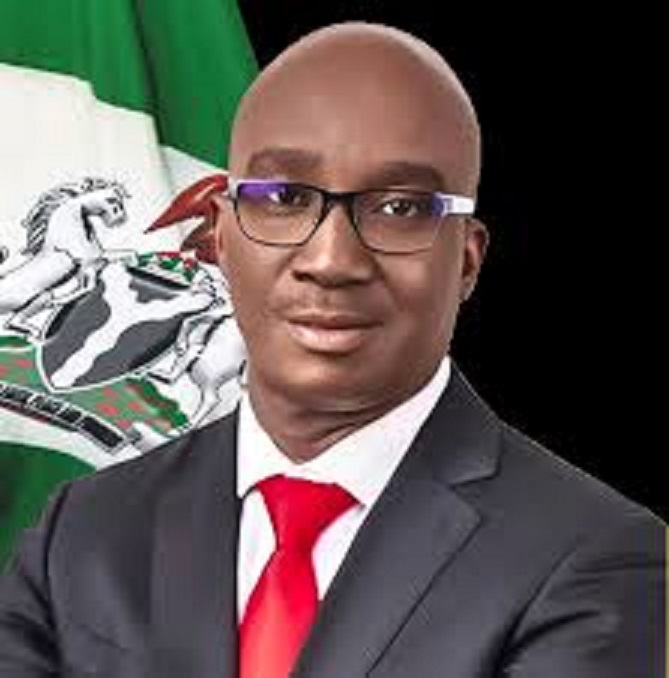
By Fred Itua
Wednesday, February 5th, 2025, could best be described as a day of gloom in Edo State, and indeed, our country, Nigeria! It turned out a black Wednesday as mind blogging, heart rending, and unbelievable revelations were brought to light.
Gloomy enough to declare for a state wide mourning, with all residents dressed in sack-cloths, covered in ashes as they mourned the depth of plundering, mind-bogging looting, heartless shady deals, lack of transparency and institutionalisation of corruption by the Godwin Obaseki led administration.
While many often taunted the immediate past administration of Obaseki as an MoU government, known only for rhetorics and no action, not many (if any) would have envisaged or imagined the level of fraud and corruption that took place under his watch as governor of Edo State.
READ ALSO: Adeleke Engages 10,000 Youths For Imole Youth Corps
Submitting its findings contained in 3,900 pages to the incumbent Governor of Edo State, Senator Monday Okpebholo, the Edo State Assets Verification Committee, a body set up on the 26th November, 2024 to assess government’s assets and liabilities, unveiled a can of worms and shady dealings perpetrated by former Gov Obaseki and his cronies that would make any conscientious citizens cringe in holy indignation.
From the reports, one thing became glaring and obvious – Obaseki ran Edo State like a mafia, and his mission resonates with the first part of John 10:10; “to steal, to kill and to destroy”, and that, he did.
Like a ravaging demon, he embarked on a plundering spree, and today, the state bleeds from his satanic kind of looting.
With over 900% increase in the official debt profile of the state (from N84b in November, 2016 to N682b in November, 2024), Obaseki, a self-proclaimed financial expert and economist, made rubbish of his profession with his clear lack of financial discipline, and outrageous financial dealings.
What is even more outrageous and annoying, is the fact that, these monies were borrowed only to be redirected into the pockets of his friends and allies in the name of consultancy, shady deals and inflated projects whose procurement processes were shrouded in secrecy.
His personal company, Afriinvest, and that of his godson, Asue Ighodalo, played prominent roles in this demonic order.
In an unprecedented and very worrisome manner, State funds were used to build structures and infrastructure and handed over to private individuals/companies with no record of financial commitments.
For example, after committing N19b of Edo State taxpayers money in constructing Radisson Hotel, Obaseki’s administration ceded away 80% of the ownership to Tribury House Ltd, a private company registered in 2024 with no single financial commitment to the project.
Within December 2022 and July 2025, Obaseki’s government paid N967 million as consultancy fees to Tanit Engineering to supervise work at the Stella Obasanjo Hospital. Yes, you heard right! N967 million not for the project itself or to purchase equipment but just to supervise work at the hospital. Even more chilling is the revelation that the procurement process in this bid was restricted to only one company – Tanit Engineering…. Who owes Tanit Engineering?
EdoBEST program, which many have now nicknamed, “EdoSCAM” was not spared in this looting spree, as the heartless, looting “general” disguised as an investment banker and technocrat serially raped the state educational sector blind, while gloating in self-deceit as he continually reeled out superfluous claims to the general public. Like one drunk in his own deception and foolishness, Obaseki embezzled the funds meant for EdoBEST, while our children and teachers suffered in harsh learning conditions.
The chilling discovery that Obaseki only remitted $5m out of the $75m released by the World Bank for basic education reforms and renovation of schools to SUBEB is not only nauseating but outright wickedness. Withholding a whopping 93% of funds meant for Edo pupils and students, Obaseki demonstrated an unusual high level of lack of empathy for the Edo child.
It is disheartening that the same man that swore on oath to protect the vulnerable Edo child stole and took that which belonged to the same child.
Time and space would fail me to talk about the many atrocities of the Obaseki-led administration as revealed in the 3,900-page committee’s report.
Is it the dirty racketeering at the demolished iconic Central Hospital valued at N5b, which now houses a private museum whose ownership is shrouded in secrecy despite Edo State Government providing all the funding? Or the road contracts in which kilometers of roads were inflated and contractors paid huge sum of money, negating the procurement laws of the state?
Three months after leaving office, the Edo State Civil servants still develop goosebumps at the mention of the name, “Obaseki”! Using a consultancy firm, Greenfield to run their duties, the civil service was made redundant as “consultants” with no proven track record or work experience, had a field day, running the service as they deem fit. The result of which saw the grounding of the Nigerian Observer, Edo Broadcasting Service, Edo line, and many others.
The circle of corruption continues unabated in Nigeria because there are no consequences for people’s actions and inactions. Many times, those who have taken advantage of their leadership position to steal and abuse offices are given a pat on the back and asked to steal no more. Those who dare to call them out are asked to focus on their own and let bygones be bygones.
In this regard, Edo people sincerely are glad that Governor Monday Okpebholo had the courage and guts to order a probe into the dealings of his predecessor. It is the way to go if sanity must be restored in our public offices. These findings (the report of the asset committee) should be made public so the average Edo citizen sees the extent to which Obaseki raped and defrauded them.
Also, the relevant authorities must step in and carry out a thorough investigation and prosecution. Gone are the days when committee reports are seen merely as academic exercise. This one must and will be different.
Obaseki must unveil the identity of these shady companies he used as cronies, and the balance of $70 million World Bank funds meant for Edo schools must be released. With the volume of revelations contained in the committee’s report, we might just have in our hands a level of looting that would make the notorious Abacha’s looting appear a child’s play.
Obaseki has bitten too much! He has eaten sour grapes, and his teeth must be set on edge. Never again should our children and generations yet unborn suffer because of the uncanny greed and heartlessness of any man.
Itua, the Chief Press Secretary to Edo State Governor, wrote from Benin City, Edo State

